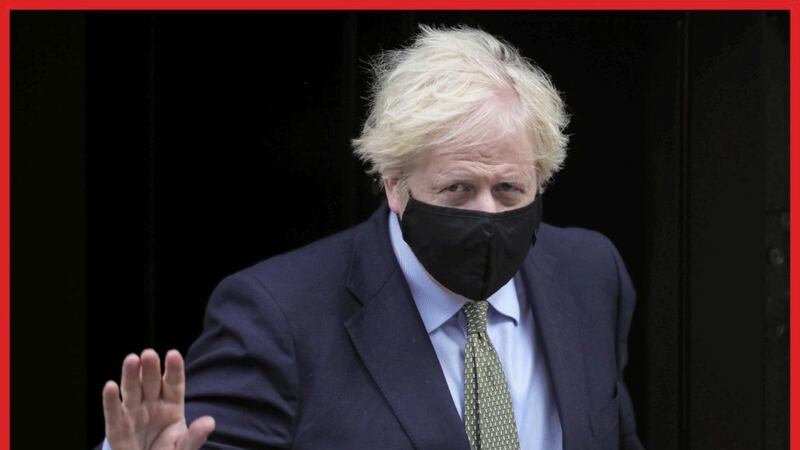In case any readers don’t know this, to concentrate on news newspapers like to have columns, days before they appear, locked into their systems.
So this is being largely written mid-breaking story on Leo the Lip Varadkar, importance as yet unclear but nickname seeming very apt, with Boris the Bumbler Johnson billed as about to ‘address the nation’ but then fronting up a press conference instead.
Late and panicked, the story as throughout the past eight months, Johnson announced another lockdown against his will. Let us count blessings. In the midst of a health crisis that re-built rather than ebbing, much of the editorial judgment on display is heartening. Exhibit A is a raft of some buoyancy: reporters here and elsewhere have scrambled effectively to stay on top of the wave after a week packed with news closer to home, and as politics spluttered in Dublin. And Exhibit B? Observe a single batch of anti-lockdown types. Since Lionel Shriver, Gemma O’Doherty and Arron Banks mock restrictions introduced in the name of public health and voice certainty that there is no pandemic, the rest of us should surely limit our contacts and be more encouraged to wear masks out of courtesy to others.
But with deniers waiting to pounce, admitting that you’re fumbling – or learning from mistakes - is not easy for public figures, tougher for libertarians. Johnson would win sympathy if he blethered less, confessed more and threw the mysteriously-influential D. Cummings out of office.
At the minute who knows much about this virus? Scientists, medics and statisticians can make semi-informed judgments, though the most impressive keep re-examining statistics.
This is the first lasting pandemic in almost everyone’s living memory. No wonder that at moments there is an almost audible bubble of panic. For most living souls born into western European society the only previous dread on a comparable scale has been war and its aftermath as in the Balkans. Or as witnesses, most of us at a distance and willing ourselves to un-see the tragedy, of the displaced and desperate washing up on Mediterranean shores or trekking through Greece, Serbia, Hungary, camping on the edge of France, packed into lorries, clinging to makeshift boats. But living through our more limited Troubles was still searing. Being driven from your home, for example, lasts in family memories, scalding and humiliating.
It is one of the problems for those who suffered most, that to others in different parts of the north, younger, or of very different backgrounds, they might as well talk Greek as describe what their families went through. We were not all in it together. There were these similarities; grief, bereavement, guilt, much of which stayed private for many people and possibly always will. And we didn’t know when it would end. For most of two decades no end seemed likely.
One personal reflection: at the height of the Troubles, curiosity and occasionally hostility came through in how senior head-office colleagues thought of us northerners staffing the Belfast office of a Dublin paper. Some wondered if they could trust us to be even-handed, or if our roots would win. (Most seemed very confident that their own attitudes were devoid of bias.) To be fair, it was probably only a minority view that writing confidently about loyalist paramilitaries meant one of us was a loyalist, while those who wrote about republicans were clearly Provos. Some of that minority were malicious, though. We weren’t completely paranoid.
This time, except to the deniers, specialists are not suspect. The media job is to keep on top of political responses almost certainly undercut here as elsewhere by infighting, in Britain by contracts funnelled to party donors. Then there is the permanent need to avoid feeding panic and to stay calm, which can involve tough judgment calls. And to get out in the air at least once a day.
It’s getting dark outside now: more next week.








